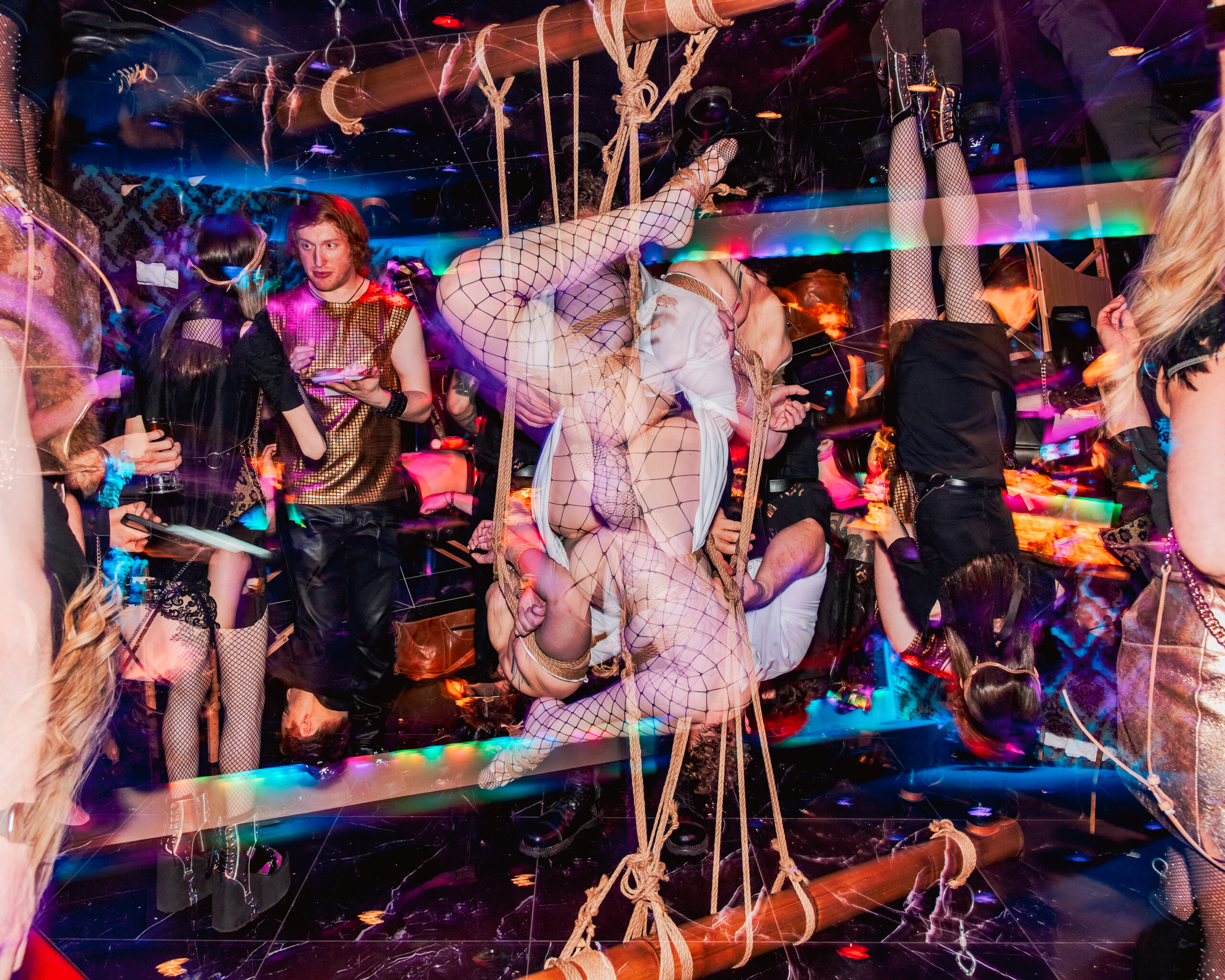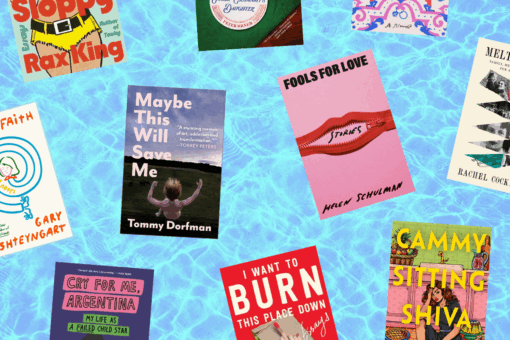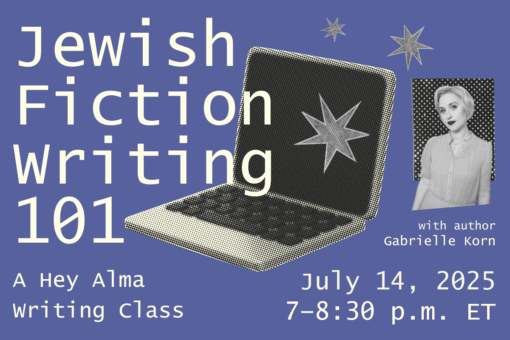Sinners’ Shabbat isn’t the typical Friday night celebration — the parties in New York nightclubs feature burlesque performances, drag queens and food served on models, all orchestrated by private chef Tova Sterling, who’s cooked for Paul McCartney and at a magic mushroom retreat. The event arose from Sterling’s desire to cater to those who might not feel welcome in more conservative and traditional gatherings, all under the tagline “Fridays are for freaks.”
Hundreds have attended Sinners’ Shabbat — including a Hanukkah edition (yes, much fire and candles were involved) and a Passover event. Sterling also reaches a broader audience through her shamelessly sexual and funny internet videos, which are only incidentally about what she’s cooking. Whether recounting dating stories or taking on roles like a married woman seeking a threesome, she subverts the tradwife trend of showcasing “women’s work” in the kitchen. Hey Alma spoke with Sterling about what goes into building inclusive Jewish spaces, who Sinners’ Shabbat is for and her love of synagogue tuna salad.
This interview has been lightly edited and condensed for clarity.
How did you start cooking?
I went to a hippie progressive school. For me, it was such a mind fuck that they were giving degrees for things that couldn’t get jobs. But my parents were college people. I grew up in the suburbs. No one [I knew didn’t] go to college. So I thought, okay, I’ve always loved cooking. I’ll go to culinary school.
First of all, it’s more gender diverse now, but I was one of three women in my class. I’m this tiny Jew in this class full of men with cleaver tattoos… I’m in this intense environment, and I thrived almost immediately.
But then I graduated, and I was like, “$15 an hour for a $100,000 education? That’s crazy.” So I decided to be a private chef. I came to New York City. I was going on job boards. I was trying to pull friends and family connections. Some of the things I did to get work were crazy. I’d go into Soho House with a tupperware full of hors d’oeuvres and my business card and hand it out until Soho House was like, “You gotta get out.”
Were there Jewish dishes you grew up with that inspired you?
I’d say so. The only times my mom would cook were on Jewish holidays. She was a terrible cook. She’s also Sephardic, so she has no excuse. But she’d boil eggs until there was green on the outside. They were still happy memories. My exposure to Jewish cuisine was going to synagogue, but we were synagogue hoppers. I remember my most visceral food memory from synagogue was tuna salad. To this day, I love tuna salad because that’s my Jewish Ashkenazi roots. I get excited to cook lighter takes on classic Jewish food now. When I started, I was more into Silk Road spices that come from the Fertile Crescent, Israel, Morocco.
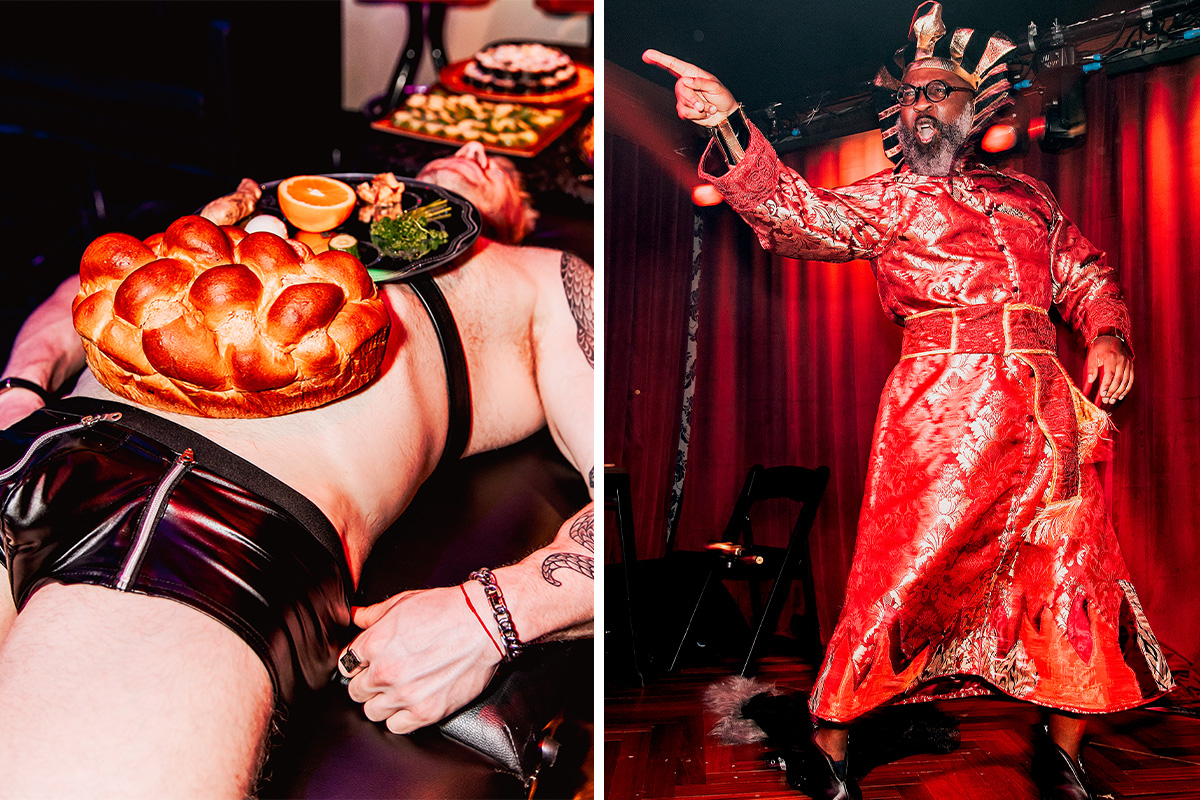
How did Sinners’ Shabbat come about?
I’m a kooky person, so the second I decided as an adult woman that I wanted a Jewish husband, I started going to these Young Jewish Professional events. There are a lot of people who fit in those spaces. They meet their partners and make friends. I wasn’t one of those people.
I felt a lot of those spaces were a bit cliquey and stagnant in terms of what people wanted to talk about. Like, I don’t have a job in marketing. I didn’t have a lot of overlap with those people. There was one event where they said all you needed to be was a young Jewish professional, so I thought, why don’t I bring a friend who’ll make me feel more comfortable?
I have a friend who’s a financial dominatrix. She asks men for money, and they derive pleasure in giving it to her. She’s not even that mean. She’s just like, “I need you to Venmo me $300,” or “I need you to get me cash.” And she’s Jewish. At the event, she wasn’t even dressed that provocatively, but then people were asking, “What do you do for a living?” She’s like, “I’m a findom.” People are somewhat intrigued by it, but there’s this polarized thing of half the people she talks to are repulsed and half are intrigued. The organizer was definitely in the former.
They emailed me after the event saying, “We think you’re really lovely, but I don’t think you understand the parameters of what a young Jewish professional is.” I was like, “Well, I don’t know what my plus one had to do with me not being a young Jewish professional.” Yes, maybe her job is very New York and bohemian and out there, but that shouldn’t exclude her. From that day, I thought, I need to find a space where not only my friend can come but that’s welcome to those who want to meet Jewish people and don’t necessarily feel they fit in YJP spaces.
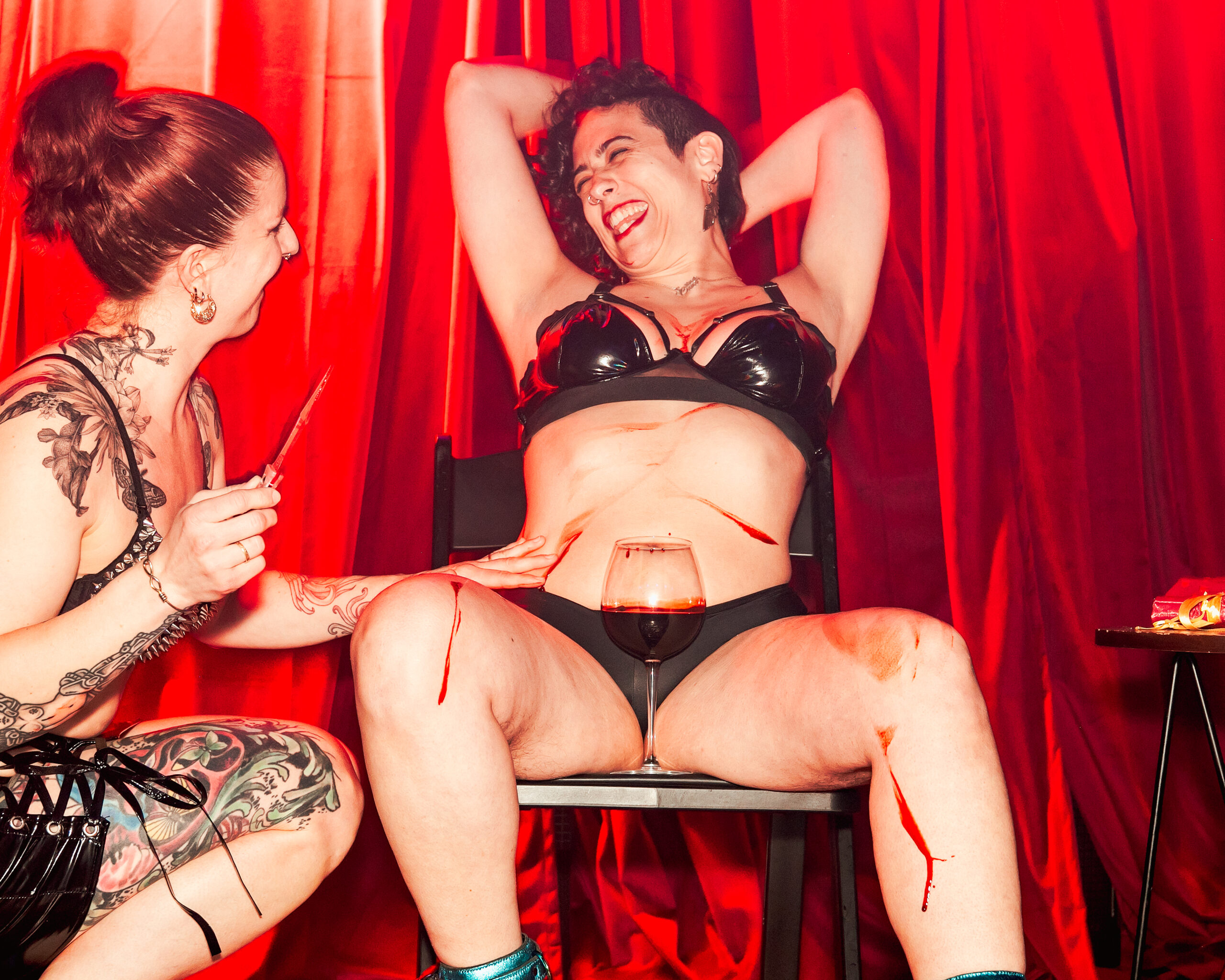
How does Sinners’ Shabbat honor the Shabbat tradition?
In general, and this is something that I say a lot, spirituality is ancient wisdom combined with modern intuition. Rest is very intuitive. I spend so much time online because I’m an influencer. For me, that’s exhausting. Is Sinners’ Shabbat Halakhah-ly aligned? No. But just being able to let go and release myself onto the dance floor or into a performance, or feeling 100% open to telling someone to eat more “because they’re so skinny,” [feels like Shabbat to me]. That is so my personality. It took so much energy at a lot of Shabbat events to pretend I’m not a lot. What resting means for me is being unafraid to let go, to be in my crazy, in my creativity. I’m a thespian. I’m a theater girl.
Can you share some stories of people finding acceptance at the event?
We’ve had a couple of gay Orthodox couples come. I didn’t even know those people felt excluded from [Jewish] spaces. They told me, “This is the first Jewish event we’ve gone to in three years.” Or there was a woman who’d just found out through ancestry.com that she was Jewish, like 100% Ashkenazi. She had no connection to her Jewish roots. She was intimidated to go to Jewish events or synagogue. But she said, “I knew, based on your marketing and signaling, that I’d be welcome here.” She ended up having a three-hour-long conversation with one of the lesbian Orthodox couples. They got coffee. Now they’re close friends. They make dinners together.
The price we pay to be that inclusive is to be on the fringe, to be a little edgy. But the payoff is there in so many instances. In order to signal that everyone’s welcome, you have to do something dramatic. I hear a lot, “I’m Jewish, but I’m a bad Jew.” It doesn’t matter if they’re Orthodox or whatever, they’ll say, “I’m a bad Jew. I mix meat and milk. I don’t keep Shabbat.” The idea of Sinners’ Shabbat is, “You’re a bad Jew? Come.” It doesn’t matter. [I also often hear], “Oh, my dad’s side is Jewish, and I identify as Jewish, but my mom’s side isn’t.” I don’t care, you’re Jewish. Come to my table. I think that energy is what exudes the idea of Sinners’ Shabbat. So it’s spicy language, but it has an earnest core.
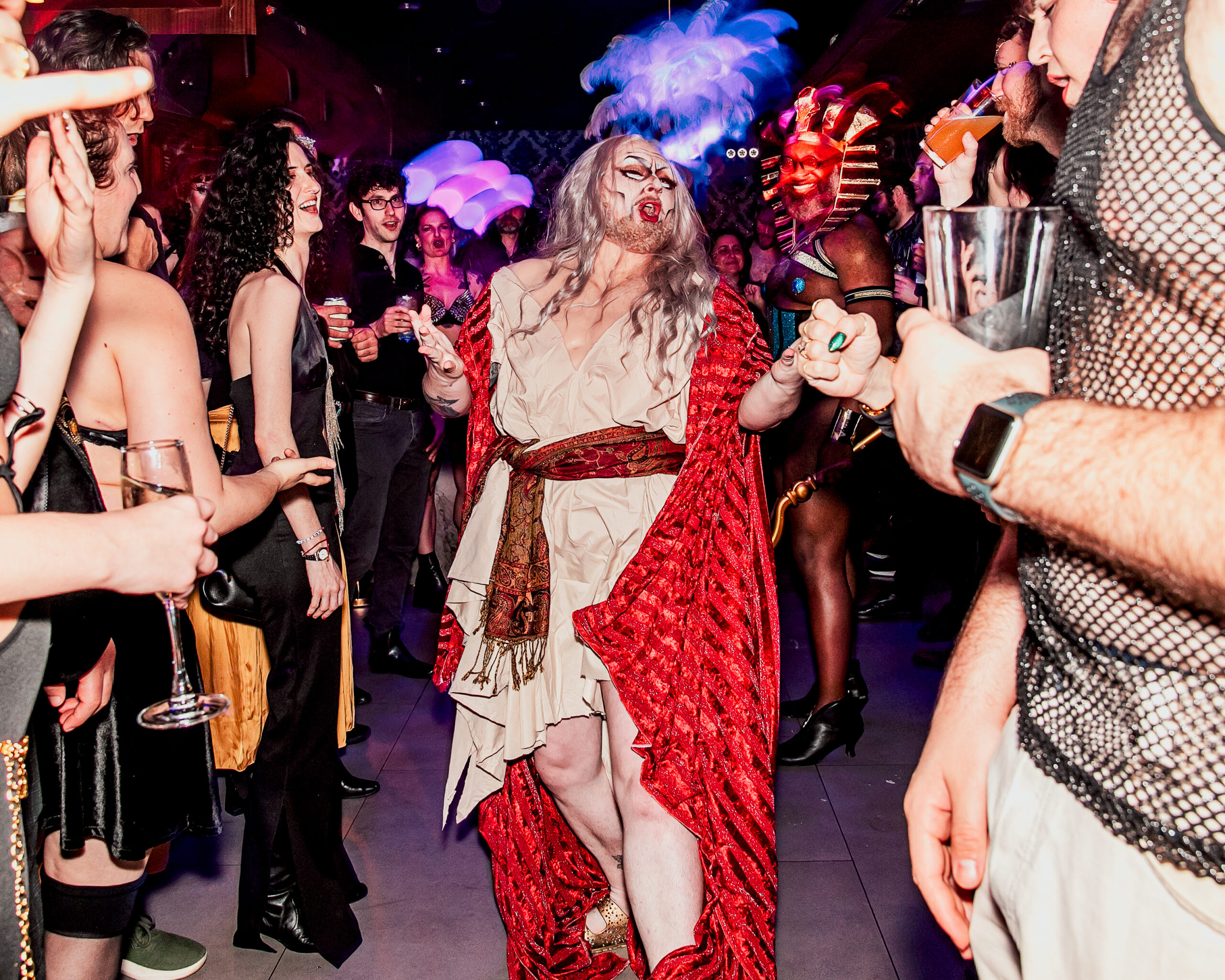
How do the performances fit into making an inclusive event?
The performers bring a lot of their own friends, so there’s a lot of mingling within the art space and people who are usually in Young Jewish Professional spaces and newcomers. There tends to be more overlap than you’d think because everyone’s out of their comfort zone… At our event, there’s a lot of stimuli. There’s shibari. There’s a rope artist. There’s a woman lying down with sushi on top of her. There’s a burlesque performance. You have so many ins to turn to the person next to you and say, “Whoa, this is happening,” rather than, “What do you do?” Because when there are novel experiences [happening around you], people have an excuse to talk about something that’s in the now, rather than something in the past or an identity trait. That’s a very level playing field in terms of talking to new people.
Are there performances that stick out to you?
Oh my gosh, so many. We did a Kiddush with a burlesque performer who brought this huge Dita Von Teese-style glass. She splashed around in this massive kiddush cup. Anyone in the splash zone was part of this fantastic experience. She had Star of David pasties. It was this real l’chaim that was so dramatic, fun and such a different take on Kiddush than anyone’s ever seen.
We had a burlesque performer who performed as the golem, which opened up a conversation about what a golem even is. This brings in Jewish mysticism. Those performances where it’s deep cuts within Jewish culture lend themselves to people who grew up more religious explaining it to people who are less religious…. It creates a space where people are storytelling to each other based on a performance.
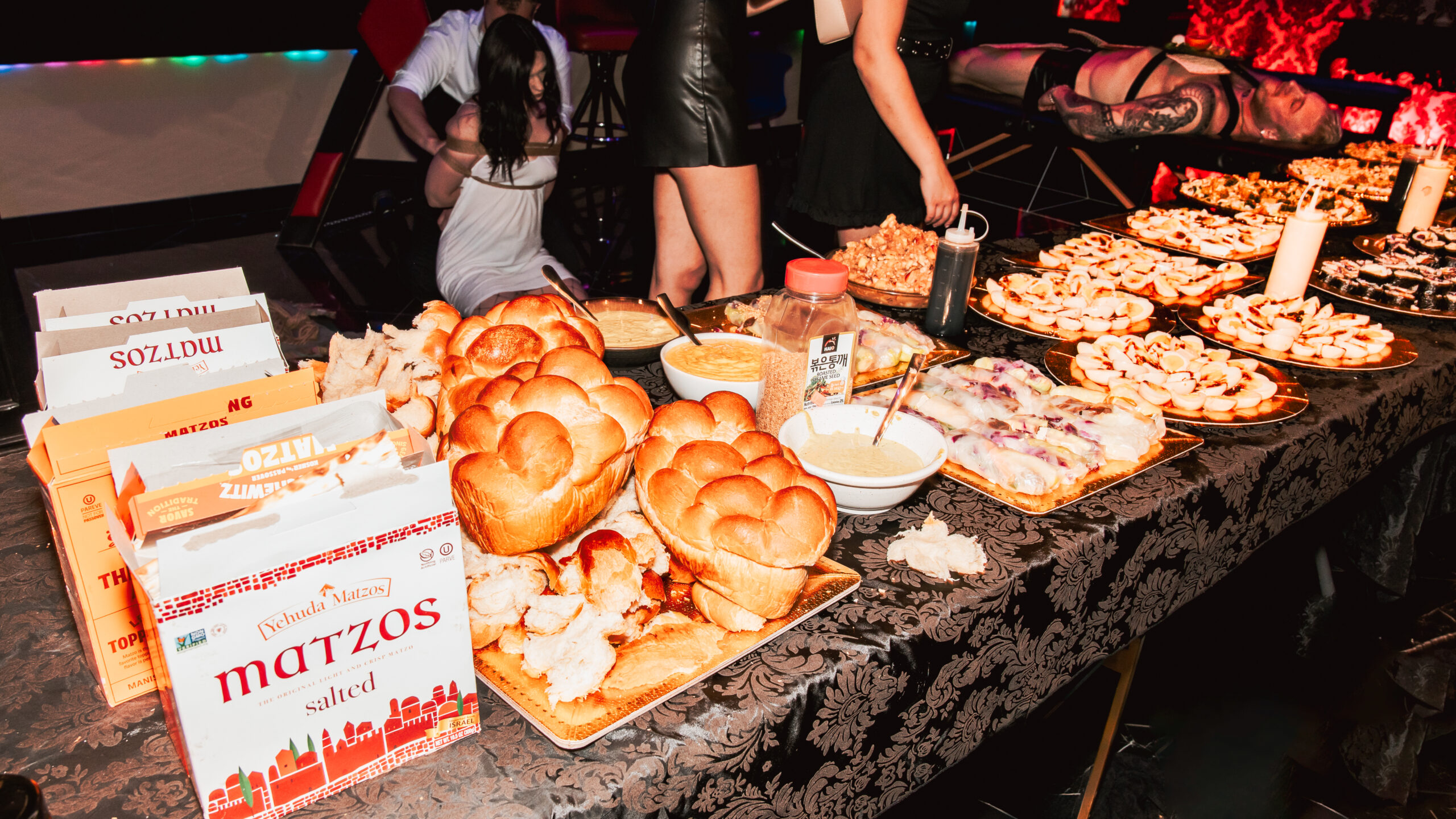
As a chef, how does the food element bring people together?
Being fed is oftentimes just as much about someone feeding you [as it is about the actual food]. There are a lot of places where you are given food, but you are not fed.
For me, it’s important for people to get the Jewish mother experience, where as they’re picking up food, people can ask me questions. I’m like, “Try this,” and, “This actually goes with a sauce.” That creates an interactive element. I’m less concerned with how avant-garde the food is. What’s been lost a bit is being given food in a warm way, in a Jewish way, in a yenta way. That’s what I like to bring back.
